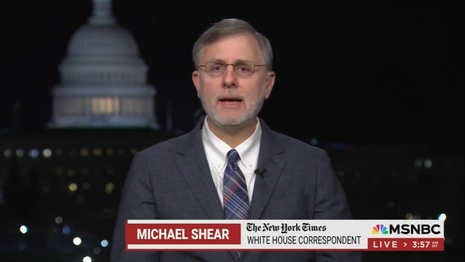 Michael Shear, a senior correspondent for the New York Times, made the front page of Sunday’s newspaper discussing how everyone dislikes Israel for good reason in his “news analysis,” “Today’s Israel: More Secure, More Isolated.”
Michael Shear, a senior correspondent for the New York Times, made the front page of Sunday’s newspaper discussing how everyone dislikes Israel for good reason in his “news analysis,” “Today’s Israel: More Secure, More Isolated.”
First, he declared victory on Israel’s behalf.
It’s Israel’s Middle East now.
After three-quarters of a century fighting hostile neighbors, the tiny Jewish country, about the size of New Jersey, has all but vanquished its enemies — Hezbollah in Lebanon, Hamas in Gaza, Houthis in Yemen and now even Iran itself, the one backing them all.
But why does Shear describe Israel fighting to win a war it didn’t start in such negative terms?
The exercise of raw power has allowed Israel, for the first time since its creation in 1948, a future mostly free from immediate threats. The risk of a nuclear Iran is diminished, or perhaps gone. Israel has stable, if uneasy, relations with Persian Gulf Arab states. And Prime Minister Benjamin Netanyahu has cemented his partnership with President Trump.
The new reality in Israel, said Yaakov Amidror, a retired Israeli general and former top aide to Mr. Netanyahu, is that places once under constant threat from Lebanon, Syria or Gaza “will be more secure than Manhattan.”
But at what cost?
Mr. Netanyahu’s relentless and unapologetic military response to the Oct. 7, 2023, Hamas-led attack that killed 1,200 people and took 250 people hostage has cemented the view of Israel as a pariah, its leadership accused of genocide and war crimes, and disdained by some world leaders. In opinion polls globally, most people have a negative view of Israel.
So what’s new? Israel’s very existence has always been loathed by Islamic states and lately, the international left. Notice how Shear and The Times don’t use words like “genocide” and “war crimes” and “pariah” for actual terrorist groups like Hamas and Hezbollah. They get the bland treatment. The only description for their fanatical viewpoint is “pro-Palestine.”
“Militancy” is mentioned once, but the word “extremist” is saved for Israelis:
There has been a surge in violence by extremist settlers against Palestinian civilians.the most intense crackdown on West Bank militancy in a generation, carrying out destructive raids, killing hundreds of people and arresting thousands.
There was more of that:
In Gaza, the war against Hamas has taken a devastating toll, killing tens of thousands of people and leaving more than a million homeless and hungry. Much of the enclave has been reduced to rubble. Poverty and hopelessness are rampant.
Israel is apparently to blame for violence against Jews worldwide:
….support for the country has become a fiercely contentious issue in Congress, the subject of angry debates and protests on college campuses and fuel for a surge in antisemitic incidents in the United States and around the world.
The political climate has become deeply polarized. Many supporters of Israel denounce any criticism as antisemitic hate, while those opposed to Israeli policies vow not to be silenced by a label they call unfair.
Shear does discuss and name anti-Semitic attacks but strained to contextualize them, noting that the Columbia protest group was a bit “extreme” — without mentioning their celebrated leader Mahmoud Khalil.
On Oct. 7, 2024, a year after the attacks by Hamas inside Israel, the pro-Palestine group that had organized student encampments at Columbia University issued a statement calling for “liberation by any means necessary, including armed resistance.”
The statements were meant to shock and provoke. They were at the extreme end of the spectrum and did not represent the views of most students, experts say.
Around the world, outrage at Israel’s actions in Gaza has been expressed largely as peaceful protests demanding an end to the war, but also by praise for the Hamas attacks, and even by some targeted attacks on Jews, killed in the name of opposition to Israel.
Shear had a petulant response to the Trump administration having “seized on the campus divisions to accuse universities of failing to respond to antisemitism.”
Democratic lawmakers say Mr. Trump is exaggerating the situation for political gain. In April, five Jewish senators wrote in a letter to the president that his stated goal of fighting antisemitism was “simply a means to an end to attack our nation’s universities.”
“Exaggerating the situation”? Jew-exclusion zones on campus, facilitated by the university itself? A “Zionists don’t deserve to live” video by a student leader of a pro-Hamas encampment?
















